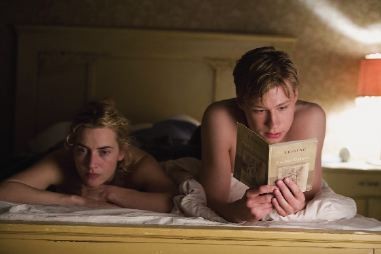The Reader

Bernhard Schlink’s 1995 novel The Reader is a tricky book to adapt to film. The plot—about how Michael Berg, a teenager in Germany in the 1950s, falls in love with an older woman with a mysterious past—may seem neat and tidy, but the story is actually about fear and guilt, ethical responsibility and moral ambiguity. Screen writer David Hare and director Stephen Daldry (who also collaborated on The Hours) attempt to portray these themes, but they fall far short of capturing them. Worse, in a wrongheaded attempt to substitute cinematic technique for emotional subtext, they employ a series of movie clichés that cheapen the film.
For instance, instead of letting the tale play out chronologically, as it does in the novel, the filmmakers insert a clumsy framing device in which Michael as an old man looks back at his teenage years with a mixture of longing and regret. The filmmakers milk this device for all they can, inserting scenes with Michael’s latest mistress and his estranged daughter, both of whom have been damaged by Michael’s inability to commit to a relationship—a consequence of his own psychic wounds.
The scenes of the original relationship are far more convincing, thanks in large part to the brave performance of Kate Winslet as the needy and enigmatic Hanna Schmitz, a trolley ticket-taker in postwar Germany who lives a quiet and secluded life. The appearance of Michael (David Kross) in her life is accidental (he vomits in front of her apartment building), but once she senses his desire for her, she responds in kind, initiating a series of afternoon trysts that include not only sweaty sex but many quiet hours in which Michael reads to her, sharing his assignments from school and later his reading of some of the world’s great literature.
Michael is so young and inexperienced, not to mention consumed with the idea of having a lover, that he doesn’t notice that Hanna is hiding something. He wouldn’t have been able to understand it anyway. Comprehension comes years later, when Michael is in law school and runs across Hanna during a trial involving Nazi war crimes. His ultimate appreciation of Hanna’s past doesn’t materialize until, as a successful but unhappy attorney, he must confront issues of betrayal and forgiveness that are painful for him to consider, let alone grasp. (The adult Michael is played by Ralph Fiennes.)
It is unfair to ask a film to capture all the subtleties of a novel, but this film sacrifices the complexity of its characters. Amid the characters’ nervous glances and quivering lips, the viewer misses the revelation that lies at the heart of the tale. The film fails to explain why secrets are allowed to fester, and as a result the themes of German guilt and of how sins of one generation are visited upon the next get lost in the flashback shuffle.
There is one speech, however, that captures some of the spiritual complexity of the novel. Ironically, the speech isn’t even in the book. Michael visits a middle-aged woman (played by Lena Olin) who has survived a concentration camp, and he receives a verbal dressing-down about the dangers of forgiveness. The speech, both frightening and moving, casts a shadow over earlier, lesser scenes. Its raw power reminds us that sometimes the best way to tell a complex tale is to focus not on what happened but on the enigmatic why.





